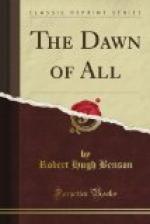If Victoria Street suggested such a thought as this, Parliament Square drove it home. As the coach drew up at the west door of the Abbey, and Monsignor stepped out with his robes about him, he heard, like a ground-bass to the ecstatic pealing of the bells overhead, the great roar of welcome roll out over the wide space, reverberate back from Westminster Hall and the Government Buildings opposite, and die down into heart-shaking silence again, as the vermilion flash was seen at the Abbey doors. The great space was filled in every foot with a crowd that was of one heart and soul in its welcome of this formal act of restitution.
Within, the monks waited, headed by their abbot, in a wide circle of some hundred persons, in the extreme end of the nave about the door. The proper formalities were carried out; and the seculars, led by the Cardinals, passed up the enormous church, between the tapestries that hung from every pillar, to the music of the Ecce Sacerdos magnus.
The old monuments were gone, of course—removed to St. Paul’s—and for the first time for nearly three hundred years it was possible to see the monastic character of the church as its builders had designed it. Over the screen hung now again the Great Rood with Mary and John; and the altars of the Holy Cross and St. Benedict stood on either side of the choir-gates.
And so they waited, the Cardinals in their thrones beside the high-altar, and the man who had lost his memory beside them; while the organ pealed out continuously overhead and endless footsteps went to and fro over the carpeted ways and the open stone spaces of the transepts. Once more upon this man, so bewildered by this new world in which he found himself, descended a flood of memories and half-perceived images. He looked up to the far-off vaulted roof and the lantern beneath the central tower; he looked down the long row of untenanted stalls; across the transepts, clean




